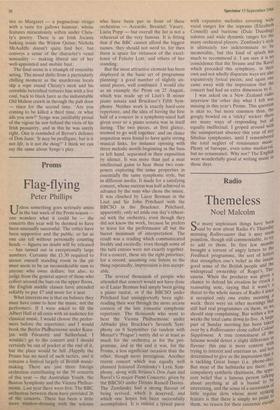Proms
Flag-flying
Peter Phillips
Unless something goes seriously amiss in the last week of the Prom season one wonders what it could be — the concerts this year will be deemed to have been unusually successful. The critics have been supportive and the public, so far as one can tell without personally counting heads — figures no doubt will be released — has turned out in exceptionally large numbers. Certainly the £1.30 required to secure oneself standing room in the pit must seem to be an inconsiderable sum to anyone who owns dollars; but also, to judge from the general aspect of those who collect around the bars on the upper floors, the English middle classes have attended reliably to pay £7 and more for a seat. What interests me is that on balance they must have come to hear the music, not the performers. If I were asked to fill the Albert Hall at all costs with an audience for classical music, I would choose the perfor- mers before the repertoire; and I would book the Berlin Philharmonic under Kara- jan with Pavarotti and Sutherland. I wouldn't go to the concert and I should certainly be out of pocket at the end of it, but the place would be full. Happily the Proms has no need of such tactics, and it remains a festival largely of British music- making. There are just three foreign orchestras contributing to the 59 concerts of this year — the Australian Youth, the Boston Symphony and the Vienna Philhar- monic. Last year there were five. The BBC orchestras between them have provided 26 of the concerts. There has been a little more window-dressing with the soloists who have been put in front of these orchestras — Accardo, Brendel, Vasary, Lucia Popp — but overall the list is not a rehearsal of the very famous. It is fitting that if the BBC cannot afford the biggest names, they should not need to, for then there is space for virtuosos of the excel- lence of Felicity Lott, and others of her standing. But the most attractive element has been displayed in the basic art of programme planning: a good number of slightly un- usual pieces, well combined. I would cite as an example the Prom on 25 August, which was made up of Liszt's B minor piano sonata and Bruckner's Fifth Sym- phony. Neither work is exactly hard-core repertoire, and the idea of having the first half of a concert in a symphony-sized hall given over to a piano sonata was in itself daring. The two pieces, at first glance, seemed to go well together, and on closer inspection were found to have quite strong musical links, for instance opening with three melodic motifs beginning in the bass or left hand, separated in their exposition by silence. It was more than just a neat intellectual game to hear these two com- posers exploring the same properties in essentially the same symphonic style, but in. different media. It made for a satisfying concert, whose success was half achieved in advance by the man who chose the music. It was clinched by Lazar Berman in the Liszt and Sir John Pritchard with the BBCSO in the Bruckner. Pritchard, apparently, only set aside one day's rehear- sal with the orchestra, even though they did not know the work, because he prefers to leave for the performance all but the barest minimum of interpretation. The result was a reading which communicated freshly and excitedly, even though some of the tutti entries were not exactly together. For a concert, these are the right priorities; for a record, assuming one listens to the thing repeatedly, imprecision is less accept- able.
The several thousands of people who attended that concert would not have done so if Lazar Berman had simply been giving a piano recital, or if the BBCSO under Pritchard had unsupportedly been sight- reading their way through the more arcane corners of the late romantic symphonic repertoire. The thousands who went to hear the Vienna Philharmonic under Abbado play Bruckner's Seventh Sym- phony on 8 September (in tandem with Mozart's 'Prague') surely did so at least as much for the orchestra as for the pro- gramme, and in the end it was, for the Proms, a less significant occasion than the other, though more prestigious. Another recent concert which was equally well planned featured Zemlinsky's Lyric Sym- phony, along with Strauss's Don Juan and Ravel's G major Piano Concerto, given by the BBCSO under Dennis Russell Davies. The Zemlinsky had a strong flavour of being revived, which it deserved, and which one hopes has been successfully accomplished. It is indeed a lyrical piece with expansive melodies covering wide vocal ranges for the soprano (Elizabeth Connell) and baritone (Dale Duesling) soloists and wide dynamic ranges for the many orchestral players. Zemlinsky's style is ultimately too indeterminate to be memorable, but this kind of splash has much to recommend it. I am sure it is no coincidence that the Strauss and the Ravel which preceded this symphony,
in their own and not wholly disparate ways are also
expansively lyrical pieces; and again onecame away with the impression that the
concert had had an extra dimension to it.
I was asked on a New Zealand radio interview the other day what I felt was missing in this year's Proms. This question is akin to, but more common than, the googly bowled on a 'sticky' wicket: there are many ways of responding but all equally ineffectual. I groped around with the unimportant absence this year of any Sibelius symphonies, until I remembered the total neglect of renaissance music. Plenty of baroque, even some mediaeval, but no renaissance. Why not? The English were wonderfully good at writing music in those days.


















































 Previous page
Previous page